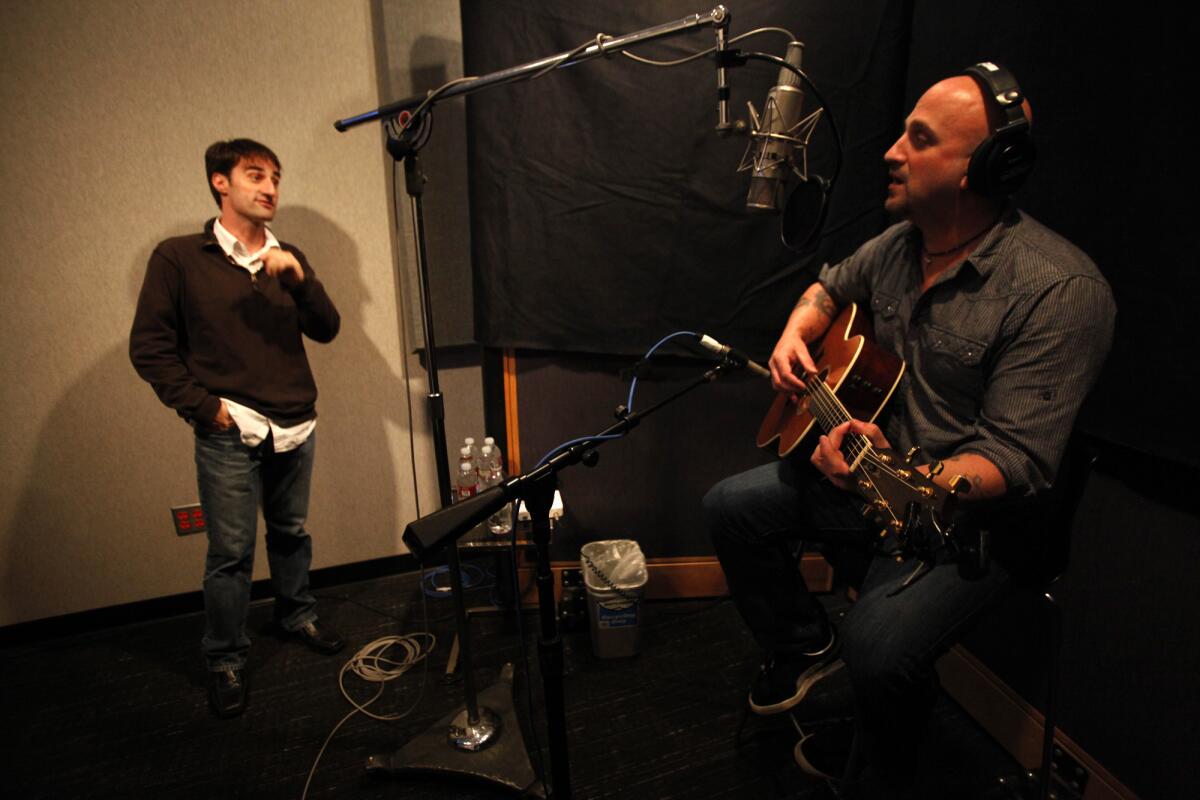Friends reunite to give Doug Stegmeyer’s last music project a push

- Share via
Inside the Capitol Records building in Hollywood, where the corridors curve in an endless loop, two former colleagues also come full circle. With the aid of an acoustic guitar, a recording engineer and four hours worth of studio time, they are here to finish a song silenced for 20 years.
It is a simple song, a lullaby, beautifully carried by piano and the sudden spirals of a wandering sax, and it was part of what should have been the first album produced by Doug Stegmeyer, who was for years Billy Joel’s bass player and backup vocalist.
Instead, it became just another thing lost when Stegmeyer committed suicide in 1995, an act that shattered, and scattered, the many people who worked with and admired him.
Now two of those people, Michael DelGuidice and John Mongiardo, are working to release “Victoria’s Song,” Stegmeyer’s favorite piece from the never-released album.
Circles move within the circles. DelGuidice, 43, the man with the guitar, spent the last 14 years heading up a Long Island-based Billy Joel tribute band. Last year, in a bit of dreams-can-come-true career magic, he joined Joel’s actual band as acoustic guitarist, backup vocalist and rehearsal pianist. He will play in Joel’s three Hollywood Bowl appearances this month, the first of which is Saturday.
But that’s not why he’s here on this day at Capitol Records. He’s here because a year or so ago, Mongiardo decided the two of them should finally finish what they started. For Doug.
Mongiardo, 45, is currently a senior television programming executive, but back in the early ‘90s he was an aspiring musician whose own dream came true when Stegmeyer offered him a job as his assistant.
For years, Stegmeyer had been an icon in the music community, especially the branch with roots on Long Island. From “Cold Spring Harbor” to “The Bridge,” Stegmeyer was a key part of Joel’s band, the man other band members referred to as “the sergeant.”
After “The Bridge,” Joel shook things up, parting from longtime producer Phil Ramone and several members of the band, including his bass player. Stegmeyer decided it was time to become a producer himself. He built a studio in his Long Island home and brought Mongiardo on.
“I idolized him,” Mongiardo says. “I could not believe I was getting to work with him.”
Together they helped hundreds of musicians lay down demo tracks while Stegmeyer looked for the artist who was going to allow him to make it big.
“These kids would come in with nothing,” Mongiardo says, “and they’d leave with these demos that made them sound like Joni Mitchell. Doug was just unbelievably generous; he had big dreams himself but he spent more time helping other people with theirs. Still, he was looking for the guy who would be his breakout artist.”
Stegmeyer chose DelGuidice (pronounced del-JU-das), then a young local guy playing gigs covering Joel, the Beatles, Elton John and others. Stegmeyer asked him to write an album’s worth of songs, which Stegmeyer then produced. There were money problems — Stegmeyer sold his house, which meant he had to build another studio — that stretched the project out over several years. Then a disagreement with the label that had bankrolled the project threatened to shelve it indefinitely.
Still, the album was all but finished when, one afternoon in 1995, Mongiardo arrived at the studio uncharacteristically late for work.
“I was never late to work,” Mongiardo says now. “I got to the studio and a bunch of musicians were waiting outside. Doug’s car was there so we knew something had happened.”
Inside the studio, Stegmeyer had shot himself.
His death stunned his friends, family and the musical community. There was a funeral, then those who had been working on the DelGuidice album went their separate ways. But the trauma lingered.
“The day Doug died was the craziest day of my life,” DelGuidice says now. “My second daughter had just been born. I was sitting there eating breakfast with my 3-year-old, and she’s wearing her “I’m a Big Sister” T-shirt, when the call came. Not in a million years would I have guessed he would do such a thing. He taught me so much. He was such a good friend to me; I just wish he had let me be a good friend to him.”
The two are sitting in a small lounge waiting for their studio time; outside it’s one of those impossibly clear Los Angeles days with a high, sudden wind that seems to blow sunlight across the sidewalks, over the tops of passing cars. DelGuidice is barrel-chested and still vaguely baby-faced beneath a skull cap and beard, with a quick smile and arms laced with tattoos. Mongiardo seems the more intense of the two, dark and slight and full of kind words about Stegmeyer.
They have just come from a gig at Belvedere Middle School where DelGuidice played for, and with, students through the Mr. Holland’s Opus Foundation. Although the men share the kind of loss that reverberates throughout a lifetime, until they reconnected in November they had not seen each other for almost 20 years.
“I have a picture of Doug in my studio,” DelGuidice says. “I think about him every day. I was so sick after he died… I took a very long break after that. I didn’t start writing again until 1998.”
Mongiardo went on to work in the music industry and then television, his own memories of that time boxed away until last year, when he saw a new Facebook page dedicated to Stegmeyer.
“It really hit everyone hard,” he says. “It made me realize how much I missed him, how much the music world had lost. I broke down a few times.”
Mongiardo got in touch with Stegmeyer’s brother Al and they started talking about releasing the DelGuidice album. “I realized I wanted to release it, to give Doug the credibility as a producer that he never got.”
He spent the next seven or eight months tracking down the financier, who happily signed over the rights. More important, all of the musicians Mongiardo contacted were grateful to talk and eager to help, and when he called DelGuidice, the two talked, and wept, for hours.
“We had all scattered,” DelGuidice says. “Nobody had spoken about it for years.”
DelGuidice attributes his decision to start a Billy Joel tribute band to Stegmeyer. And, in an odd bit of synchronicity, the invitation to Joel’s band came right around the time Mongiardo had sought him out. Not that it seems odd to either of these men.
“It was Doug,” DelGuidice says. “Definitely. I wish he was alive so he could see what I’m doing right now. I think he would be proud.”
In the end, DelGuidice decided he did not want the entire album released. He is working on another album and didn’t want to preempt it with a 20-year-old work.
“I sound like a kid,” he says, laughing.
“Victoria’s Song” written for DelGuidice’s young daughter, now 25, was Stegmeyer’s favorite. So the two decided to release two versions on iTunes and other digital outlets: The original produced by Stegmeyer and an updated version they are recording today. Proceeds of both will go to Stegmeyer’s mother, still living on Long Island.
Once in the studio, DelGuidice sings the lullaby with only an acoustic guitar, recording multiple tracks that allow him to provide his own backup. Sitting in the control room, Mongiardo listens and watches DelGuidice on the monitor.
“It is so strange,” he says during one playback, “to be doing this after all this time.” You sound great, really great, he tells DelGuidice, offering the kind of encouragement he learned so long ago from a man whose last project will finally be heard.
More to Read
The biggest entertainment stories
Get our big stories about Hollywood, film, television, music, arts, culture and more right in your inbox as soon as they publish.
You may occasionally receive promotional content from the Los Angeles Times.








